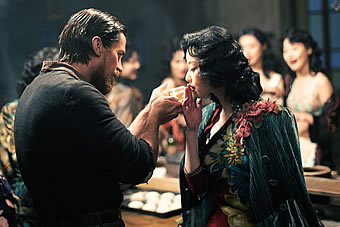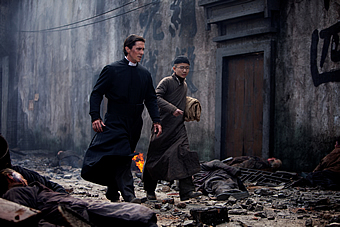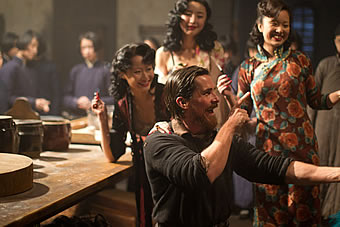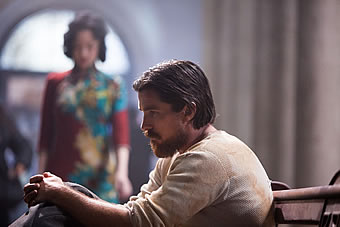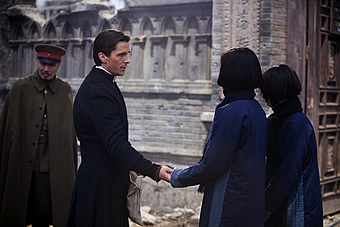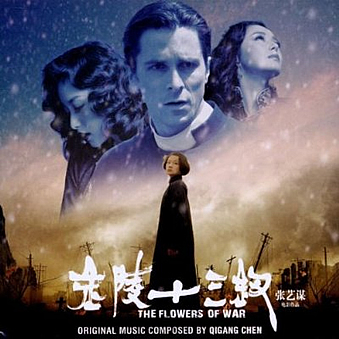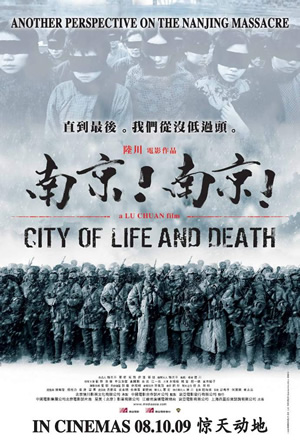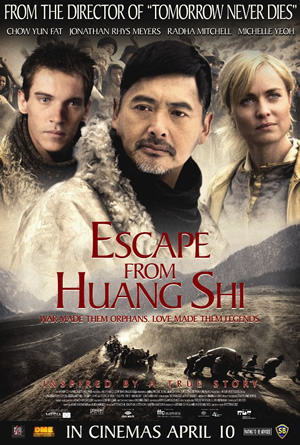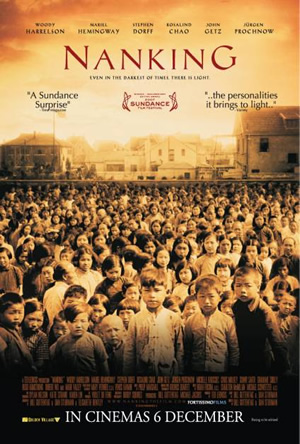THE FLOWERS OF WAR (Jin ling shi san chai) (2011)
Genre: Drama/War
Director: Zhang Yimou
Cast: Christian Bale, Ni Ni, Zhang Xinyi , Huang Tianyuan, Tong Dawei, Atsuro Watabe, Shigeo Kobayashi, Cao Kefan
Runtime: 2 hrs 25 mins
Rating: NC-16 (Violence and Sexual Violence)
Released By: Shaw
Official Website: http://www.theflowersofwarthemovie.com/
Opening Day: 29 March 2012
Synopsis: From internationally celebrated director Zhang Yimou (Ju Dou, Raise the Red Lantern, Hero, House Of Flying Daggers) comes a story of love and war - and a band of outcasts who emerge as unlikely heroes from the shadows of a city's occupation. At once lyrical and visceral, the film enters the apocalyptic world of Nanjing in 1937 only to find a vibrant human story about the invisible people of the city and a series of unexpected relationships that lead to a resonant act of sacrifice.
It begins when the danger in the streets of Nanjing throws together a group of opposites --a flock of shell-shocked school children, a dozen seductive courtesans, and a renegade American (Academy Award winner Christian Bale, The Fighter, The Dark Knight) posing as a priest to save his own skin, or so he thinks - all seeking safety behind a walled cathedral. Trapped by marauding soldiers, over the next few days the prejudices and divides between them will fall away as they unite around a last-ditch plan to protect the children from impending catastrophe.
MOVIE REVIEW:
Because foreign commentators have not accorded the appropriate significance to the subject of the Japanese occupation of Nanking, there is a certain amount of righteous indignation whenever it is raised amongst the Chinese, whose ancestors had suffered at the hands of the Nippon invaders way back in 1937. Indeed, the fact that they have termed that dark chapter in their history ‘the rape of Nanking’- alluding not just to the pillorying of the city, but also literally to its inhabitants and especially its women- says a lot about their sentiments on the matter.
It is therefore quite impossible to expect objectivity from any Chinese treatment on the subject- even if it is from internationally acclaimed director and the once-enfant terrible of Chinese cinema Zhang Yimou- so the best one can hope for is subtlety, with Lu Chuan’s earlier box-office hit ‘City of Life and Death’ being an excellent example. Fortunately therefore, though Zhang Yimou’s take begins on an overtly jingoistic slant, it eventually settles for a nuanced approach that exudes the very humanity at the heart of Yan Geling’s story, becoming a moving and poignant account of heroism and self-sacrifice.
Opening with the first of just two battle sequences throughout the whole film, Yimou starts off emphasising the heroism of the Chinese soldiers who were outnumbered and outgunned by the invading Japanese troops. Amidst the blatant chest-thumping is a pair of convent girls trying to get back to the safety of their Catholic church, as well as an American mortician John Miller (Christian Bale) sent to attend to the last rites of the recently deceased parish priest. While the church’s boy warden George (Huang Tianyuan) and the dozen schoolgirls under his care think that Miller could be their way out of the city, he turns out to be anything but- well at least in the beginning.
Content to remain nonchalant to the plight of the girls, Miller instead binges on the communion wine supply in the church’s basement and ransacks the church for any money left as payment for his services. Better still, when some 13 ladies from the local brothels seek shelter at the church, he welcomes them as if elated at the prospect of his own personal harem. But transformation is at the heart of Yimou’s tale, and even though you know that by the end of the story Miller will rise to the occasion to save the girls, the path to that dramatic character turn is still deeply affecting.
Kudos to Liu Heng’s elegant screenwriting, whose collaboration with Yimou goes as far back as the latter’s ‘Ju Dou’, for crafting a moving character arc for Miller- beginning with an act of admirable courage when Miller puts on the priestly robes one day in a bid to stymie the Japanese from forcing themselves on the underage schoolgirls. Ever so delicately, the movie charts his change of heart from a once self-centred opportunist to a Fatherly figure looking after both the convent girls and the courtesans and eventually turning into a saviour for the former.
Just as skilfully, Yimou also charts the transformation of both groups of ladies. At the crux of it is a truly outstanding act of self-sacrifice on the part of the courtesans, as their egocentricity slowly but surely gives way to empathy for the schoolgirls and culminates in an extraordinary gesture of courage. We won’t spoil this plot point for you- suffice to say that Yimou handles it with beautiful restraint, and what could easily have been maudlin melodrama is instead cast as an uplifting testament of the common bonds of humanity that unite us all despite our social backgrounds.
Yimou’s adroit storytelling is complemented with the stirring performances of a top-notch cast. Christian Bale is perfectly cast, his usual understated but no less powerful acting creating a compelling character in Miller. It also enables him to blend in nicely with the rest of the massive ensemble, despite being the lone Westerner in a cast of Asians. Refusing to monopolise attention on himself or his character, he too strikes up great chemistry with his co-stars Tianyuan and newcomer Ni Ni- the latter of which steals the show with her luminous portrayal of Yu Mo, the pseudo-leader of the courtesans whose radiant beauty masks an equally sharp mind.
Evocative too is d.p. Zhao Xiaoding’s cinematography, which avidly captures both the sobering horrors of war as well as the cautious moments of quiet optimism between the girls. In particular,mXiaoding also uses the convent’s stained glass as a nice recurring motif to signal the omnipresence of God despite the atrocities and bleakness. And despite boasting none of the gaudy excesses of Yimou’s previous big-budget extravaganzas (a la ‘Curse of the Golden Flower’), production designer Yohei Tanada deserves credit for the visually intricate designs of both the cathedral as well as the war-torn streets of Nanking.
Nonetheless, what will likely resonate most at the end of the day are the film’s twin messages of courage in the face of fear and humanity in the face of atrocity. Yimou’s confident direction also makes for a multi-faceted movie that offers various perspectives on the war through its myriad characters, while placing Miller, Yu Mo and a thirteen-year old convent girl Shu (Zhang Xinyi) at the heart of it. Don’t be deterred by its grim subject matter, or its partiality to the matter- just as its title suggests, there is beauty to be found in the unlikeliest of places, and in spite of the inevitable scenes of heartbreak and despair, it is a quietly stirring and deeply poignant drama of self-sacrificial love, especially meaningful with the impending occasion of Good Friday as a reminder of this highest form of love.
Movie Rating:




(Objectivity aside, this is a quietly stirring and immensely poignant drama of unlikely heroism and self-sacrificial love that will reaffirm your belief in the ability of mankind to demonstrate the highest form of humanity in the midst of inexplicable atrocity)
Review by Gabriel Chong
You might also like:
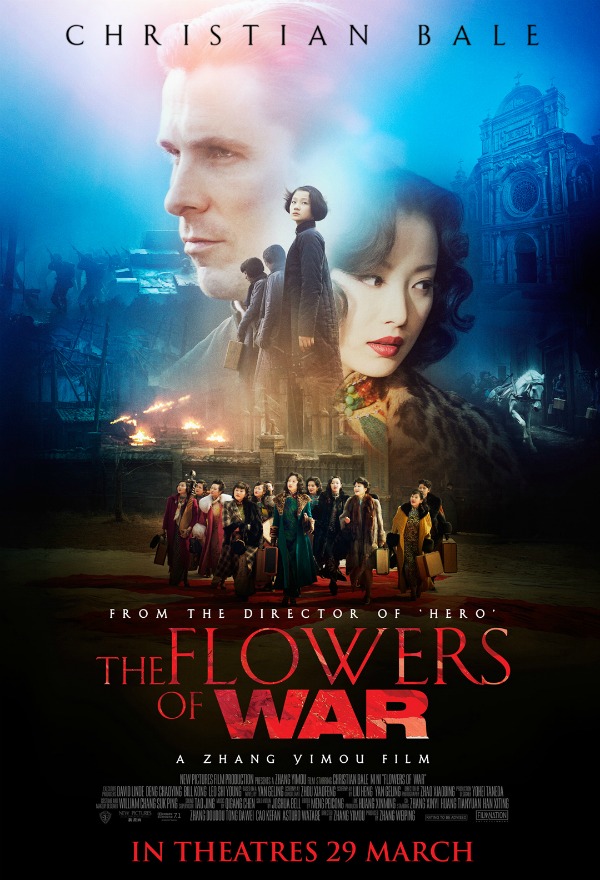
Movie Stills
